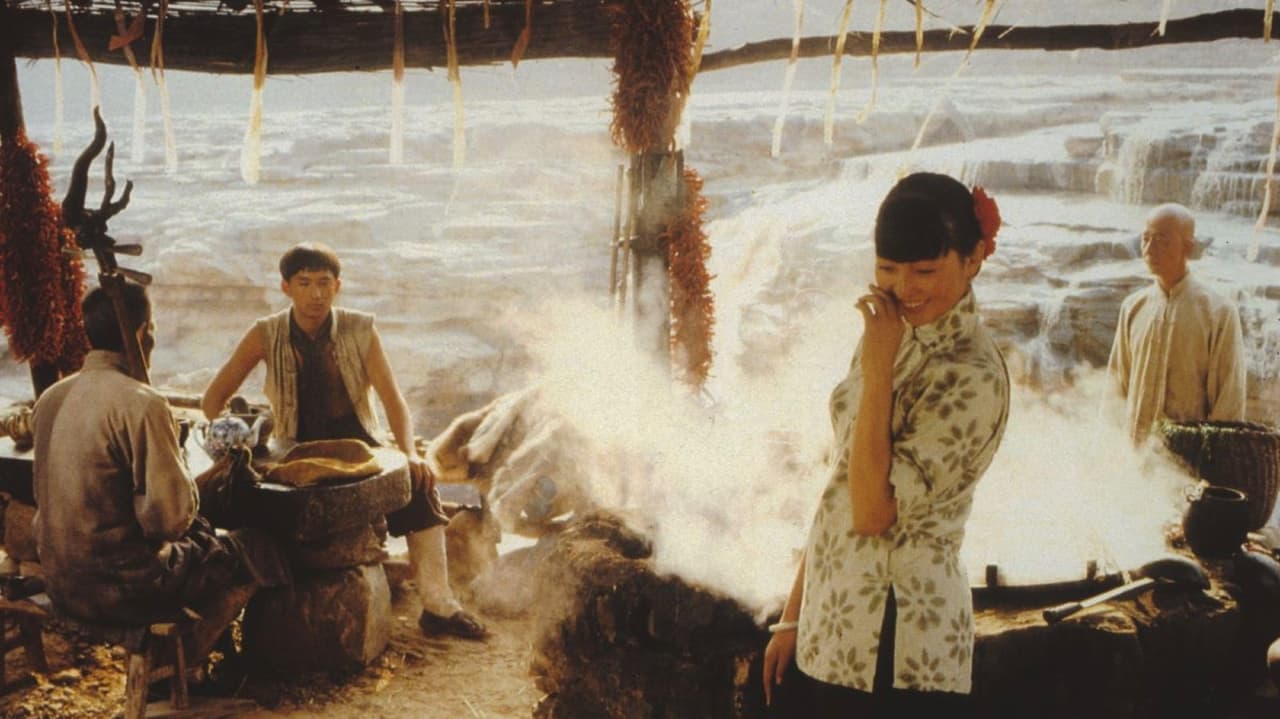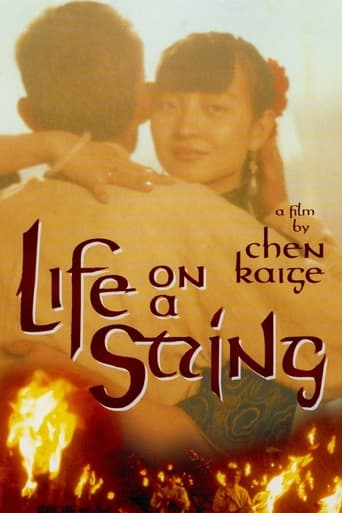

Memorable, crazy movie
... View MoreGreat visuals, story delivers no surprises
... View MoreCrappy film
... View MoreIf you're interested in the topic at hand, you should just watch it and judge yourself because the reviews have gone very biased by people that didn't even watch it and just hate (or love) the creator. I liked it, it was well written, narrated, and directed and it was about a topic that interests me.
... View MoreThe literal translation is "Singing while Walking". Compared to Yellow Earth (Huang Tu Di) seven years ago, the director has made a obvious giant stride in the criticism of not-so-favorite part of traditional Chinese culture, which is to blame for the human tragedies in this film.
... View MoreTravelers arriving. Travelers departing. This is what Life on a String is about. This is what life is about.Life on a String, an early film by Chen Kaige, the director of Farewell My Concubine, is based on a story by Tiesheng Shi about two blind people, a singer/saint referred to as Old Master and his young apprentice Shitou. Old Master learned when he was a small boy that following the breaking of 1,000 strings on his banjo, his sight will be restored. This film is about his quest. It is essentially a meditation on vision and blindness, silence and song, and life and death. It is a serene, touching, and beautiful film, but not for the attention-span challenged.Old Master (Liu Zhongyuan), leads his blind apprentice Shitou (Huang Lei) on the road through an awe-inspiring landscape of mountains and rivers in Western China. Old Master is frail and counts the days when the final string will be broken and Shitou will take his place. His student, however, wants a different type of life. He wants romance and when he meets and falls in love with a young villager (Xu Qing), he goes against his master's wishes to be with her.Life on a String is saturated with wondrous folk music from Chinese composer Xiao-Song Qu. Old Master sings in a deep, melodious, and powerful voice as he entertains amazed villagers by firelight. Nearing the end of his life, he continues to play his strings earnestly to reach his goal. His songs have the power to stop warring groups and turn them toward peace (Old Master is much needed today in the Middle East).The striking visual power of the film is balanced by fine characterizations and the relationship between Shitou and Lanxiu has remarkable innocence and chemistry though I was unclear about why their relationship ended the way it did.Both Old Master and Shitou question their blindness. Throughout their journey, the master questions whether it was worth sixty years of waiting to be able to see. "Is the world I'm going to see, the same as the world inside of me? "Is it worth it", he asks himself. And he answers, "It is not worth it It is worth it".Both are reconciled to their fate in a final luminous scene of acceptance. After a conversation with the God of Death, Old Master sings to assembled villages under the firelight, "One day", he sings, "all of us will sing, no more sadness, no more tears. We will all lift our voices and sing for joy". For me, this is one of the most uplifting moments in all of cinema.Watching Life on a String is like bathing in sunlight. I felt such a tremendous sense of calm and longing for the infinite that I ended up watching it three times, mesmerized, with an enhanced spiritual feeling each time. I may not watch any more movies, just keep watching this one each week until I die.The God of Death says that life is a game in which some play better than others.Let the good times roll.
... View MoreFew films have effected me as this one, a quiet gem that details the long life of a blind musician searching for purpose. He is considered a saint by the local villagers, often wisely singing on the pettiness of their quarrels, and the beauty of life and brotherhood...As in Bergmans' 'Wild Strawberries', the protagonist is at a point in his life where death is around the corner. His one wish is to regain his sight, his hope had been sown by his own dying master. When a set amount of strings are plucked a secret compartment in his instrument will open, the cure inside.The film is beatifully photographed, the acting heartfelt and believable, and the music,the music...Well, the first time I saw this film, it wasn't from the beginning, in fact, I caught the last 10 minutes of it. The old man,singing to a crowd , finally excepting his fate. He muses the love that he felt for the villagers, and the disappointments and joys that came with his life. It was one of the most beautiful segments I had seen in film. I was actually brought to tears...Overall an excellent film, and I'm looking foward to seeing this director's other work.10 out of 10
... View MoreWhen one thinks of the term "enlightenment," as least with regards to cinematic portrayals, the usual images that pop up are robed monks chanting Buddhist sutras or quoting mind-imploding Zen insights. But as any good Buddhist can tell you, the roads to enlightenment are infinite. This particular old master's path to enlightenment involves the snapping of one thousand banjo strings. When the last string is broken, the old man will at last see the truth and be ready to die."Life on the String" is one of the most enjoyable and bittersweet Chinese costume epics I've ever experienced. But to label this somewhat obscure gem as a "costume epic" is a bit of an injustice, given its highly unusual story.A blind old master of the pipa (Chinese banjo) and his blind apprentice wander through the wastes of Western China (Xinjiang), in search of enlightenment and inspiration. Upon settling in an abandoned hovel, the old master eagerly anticipates enlightenment and the sweet release of death, as he is on his 995th string.This film, directed by the acclaimed director of "Farewell, My Concubine," is perhaps one of the most magnificently shot films I've ever encountered. But the most amazing aspect of this film is the music. You KNOW the old master is indeed a master when he plays his banjo. His melancholy, dreamy melodies give this film a genuine dream-like quality. The English subtitles, which are competently written, can only hint at the sublime Chinese poetry of his lyrics. The old man's music can work magic...a type of magic that the violent world that surrounds him sorely needs.Despite "Life on a String"'s deliberate pace, you will be caught up in the story and its eccentric cast of characters. It's hard not to get lost in the seemingly endless horizons of the Chinese deserts and the hypnotic singing of the old master which swells with a lush symphonic accompaniment when he really needs to exert his magic. I also found myself feeling the old man's mounting excitement at his approaching death/enlightenment, as well as his temptation to sink into despair at this imperfect world's follies.I highly recommend "Life on the String" for when you're in a contemplative, or perhaps "poetic", mood. For a film which deals with the theme of death, it is a very positive and uplifting work, forgoing the usual gloom and doom aura that often surrounds death. It is a film that cries out for the stillness of the soul so that one may hear a truth that can only be expressed in song.
... View More